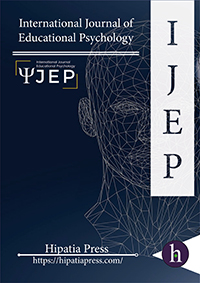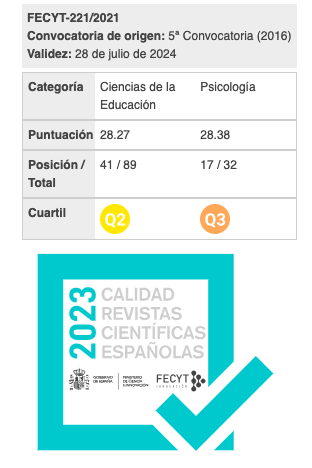Family Orientation and Achievement Goal Orientations Among the Children of Immigrant and Non-Immigrant Families
Keywords:
Downloads
Abstract
The current study examined the role of family orientations on the achievement motivations (i.e., achievement goal orientations and intrinsic motivation) of high school youths of different generational status (i.e., from immigrant or non-immigrant families) when their perception of their parents’ goals and classroom goal structures were tested simultaneously as predictors. A total of 331 high school students (ninth grade; ages 13–16, with 96% of the students in the ages of 14 or 15; 141 boys and 187 girls) from one high school in the United States participated in the study, completing a series of assessments with regard to their math classes. The findings show the complex role of the family contexts (parent goals and family orientations) on the adaptive mastery goals for children of immigrant families, going beyond previous studies that reported the relationships between family orientation and performance-approach or less adaptive performance-avoidance goals. This study still found that students’ family orientations strongly predicted their desire to win over their peers with certain levels of internal pressure in order to meet their parents’ expectations, aligned with previous literature. Through examining a context beyond the classroom context, studies should continue to examine the larger family and cultural context in understanding students with diverse backgrounds.Downloads
References
Aiken, L. S., & West, S. G. (1991). Multiple regression: Testing and interpreting interactions. Newbury Park, CA: Sage
Google Scholar CrossrefBong, M. (2008). Effects of parent–child relationships and classroom goal structures on motivation, help-seeking avoidance, and cheating. Journal of Experimental Education, 76(2), 191–217.
Google Scholar CrossrefEccles, J. S., & Wigfield, A. (2002). Motivational beliefs, values, and goals. Annual review of psychology, 53(1), 109-132.
Google Scholar CrossrefElliot, A. J., & McGregor, H. A. (2001). A 2 × 2 achievement goal framework. Journal of Personality and Social Psychology, 80(3), 501-519.
Google Scholar CrossrefEsparza, P., & Sanchez, B. (2008). The role of attitudinal familism in academic outcomes: A study of urban, Latino high school seniors. Cultural Diversity and Ethnic Minority Psychology, 14(3), 193.
Google Scholar CrossrefFriedel, J. M., Cortina, K. S., Turner, J. C., & Midgley, C. (2007). Achievement goals, efficacy beliefs, and coping strategies in mathematics: The roles of perceived parent and teacher goal emphases. Contemporary Educational Psychology, 32(3), 434–458.
Google Scholar CrossrefFuligni, A. J. (1997). The academic achievement of adolescents from immigrant families: The role of family background, attitudes, and behavior. Child development, 68(2), 351-363.
Google Scholar CrossrefFuligni, A. J. (2001). Family obligation and the academic motivation of adolescents from Asian, Latin American, and European backgrounds. New Directions for Child and Adolescent Development, 2001(94), 61-76.
Google Scholar CrossrefFuligni, A. J. (2011). Social Identity, Motivation, andWell Being Among Adolescents from Asian and Latin American Backgrounds. In Health disparities in youth and families (pp.
Google Scholar Crossref-120). Springer, New York, NY.
Google Scholar CrossrefFuligni, A. J., Tseng, V., & Lam, M. (1999). Attitudes toward family obligations among American adolescents with Asian, Latin American, and European backgrounds. Child Development, 70(4), 1030-1044.
Google Scholar CrossrefFuligni, A. J., & Yoshikawa, H. (2004). Investments in children among immigrant families. Family investments in children’s potential: Resources and parenting behaviors that promote success, 139-162.
Google Scholar CrossrefHu, L. T., & Bentler, P. M. (1999). Cutoff criteria for fit indexes in covariance structure analysis: Conventional criteria versus new alternatives. Structural equation modeling: a multidisciplinary journal, 6(1), 1-55.
Google Scholar CrossrefKim, J. I., Schallert, D. L., & Kim, M. (2010). An integrative cultural view of achievement motivation: Parental and classroom predictors of children's goal orientations when learning mathematics in Korea. Journal of Educational Psychology, 102(2), 418.
Google Scholar CrossrefKline, R. B. (2015). Principles and practice of structural equation modeling (4th ed.). New York, NY: Guilford Press.
Google Scholar CrossrefLinnenbrink, E. A. (2005). The Dilemma of Performance-Approach Goals: The Use of Multiple Goal Contexts to Promote Students' Motivation and Learning. Journal of educational psychology, 97(2), 197.
Google Scholar CrossrefLoera, G., Rueda, R., & Oh, Y. J. (2015). Learning and motivational characteristics of urban Latino high school youth. Urban Education, 53(7), 875-898.
Google Scholar CrossrefMidgley, C., Maehr, M., Hruda, L., Anderman, E., Anderman, L., Freeman, K., & Urdan, T. (2000). Manual for the patterns of adaptive learning scales (PALS). Ann Arbor, MI: University of Michigan.
Google Scholar CrossrefMuthén, L.K. & Muthén, B.O. (1998-2017). Mplus User’s Guide (8th ed). Los Angeles, CA: Muthén & Muthén.
Google Scholar CrossrefPerreira, K. M., Fuligni, A., & Potochnick, S. (2010). Fitting in: The roles of social acceptance and discrimination in shaping the academic motivations of Latino youth in the US Southeast. Journal of Social Issues, 66(1), 131-153.
Google Scholar CrossrefPortes, A., & Rumbaut, R. G. (2001). Legacies: The story of the immigrant second generation. Univ of California Press.
Google Scholar CrossrefRyan, R. M., & Connell, J. P. (1989). Perceived locus of causality and internalization: Examining reasons for acting in two domains. Journal of Personality and Social Psychology, 57(5), 749-761.
Google Scholar CrossrefUrdan, T. (2004). Predictors of academic self-handicapping and achievement: Examining achievement goals, classroom goal structures, and culture. Journal of Educational Psychology, 96(2), 251-264.
Google Scholar CrossrefUrdan, T., & Mestas, M. (2006). The goals behind performance goals. Journal of Educational Psychology, 98(2), 354. doi:10.1037/0022-0663.98.2.354.
Google Scholar CrossrefUrdan, T., Solek, M., & Schoenfelder, E. (2007). Students’ perceptions of family influences on their academic motivation: A qualitative analysis. European journal of psychology of education, 22(1), 7-21.
Google Scholar CrossrefWolters, C. A. (2004). Advancing Achievement Goal Theory: Using Goal Structures and Goal Orientations to Predict Students' Motivation, Cognition, and Achievement. Journal of Educational psychology, 96(2), 236.
Google Scholar CrossrefDownloads
Published
Almetric
Dimensions
How to Cite
Issue
Section
License
All articles are published under Creative Commons copyright (CC BY). Authors hold the copyright and retain publishing rights without restrictions, but authors allow anyone to download, reuse, reprint, modify, distribute, and/or copy articles as the original source is cited.
















